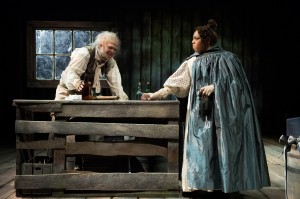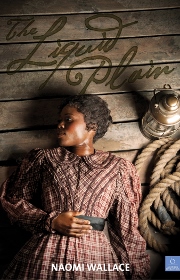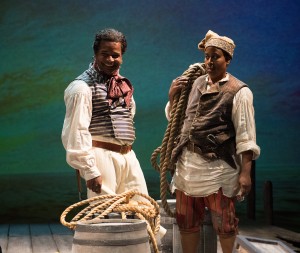NOT PLAIN BUT TOO LIQUID
In her tale of two slaves who seek passage back to Africa in 1791 Rhode Island, Naomi Wallace has constructed a compelling narrative based on true events and people. Yet in her personal voyage to examine the slave trade and those who profited from it and rebelled against it, Wallace is more intent on raising provocative  questions than on telling a story. The result is an admirable and watchable but ultimately baffling experience.
questions than on telling a story. The result is an admirable and watchable but ultimately baffling experience.
Adjua (June Carryl), an escaped African from a slave ship in Bristol, RI, and Dembi (Kimberly Scott), a runaway from Charleston, have bonded and are now dockside scavengers who await a hired vessel to return them to Africa. Cranston (Danforth Comins) is a drowned white man they discover who suddenly comes back to life. As memories return to the amnesiac sailor, so too do the rascally salts he once associated with: Liverpool Joe, a free black from England and captain of the ship poised to take the slaves back to Africa; and Balthazar (Armando Durán), a crusty Irish sailor.
Act I closes as the five prepare to set sail, but a purposefully ambiguous event occurs, one which sets in motion the story of Bristol (Bakesta King), a middle-aged free black woman from England who returns to the same Rhode Island city 46 years later. Act II follows her journey as she seeks to solve the mystery of her origins and that of her parents, presumably Adjua and Dembi. She meets Cranston, now a dodgy  tavern keep; James De Woolf (Michael Winters), a former slave ship captain and senator; and even the poet William Blake (Durán), whom she discovers as a decomposing cadaver imprisoned in a hanging torture cage.
tavern keep; James De Woolf (Michael Winters), a former slave ship captain and senator; and even the poet William Blake (Durán), whom she discovers as a decomposing cadaver imprisoned in a hanging torture cage.
The scene with Blake is captivating, but it also serves to highlight the strengths and weaknesses of Wallace’s narrative. In the first act, Adjua has discovered a book which contains a handwritten copy of Blake’s 1797 “The Chimney Sweeper,” which poeticizes the plight of boys who were sold to clean chimneys; as a slave, Adjua relates to the harshness of child labor. Now Bristol has the book in her possession. As she seeks answers and possibly justice, Blake suddenly appears. Unlike the ghosts who died of plague in Angels in America, Blake’s presence is confusing and incompatible with the straightforward scenes which came before: Is Bristol imagining the spirit of Blake? Does this mean that the other characters are in her imagination as well?
The seascape of Wallace’s play is awash in metaphors that float tantalizingly on the surface of her story, but without clarity of narrative and a true protagonist, the audience is left to analyze what exactly is going on. Wallace is a master of poetic imagery in her dialogue, but her characters are seemingly created to serve the playwright’s agenda – the specter of slavery in America. As such, however fascinating these characters are, they have little arc and do not serve to connect us emotionally with the depth of her subject matter. One metaphor, a parasitic Guinea  worm which remains in Cranston’s leg, is so vivid that we are willing to forgive its obviousness.
worm which remains in Cranston’s leg, is so vivid that we are willing to forgive its obviousness.
A similar problem plagued Tony Taccone’s Ghost Light at OSF in 2011, in which a terrific story was obfuscated by confusing metaphorical apparatuses. Similarly, the poetic writing and obscured storytelling in Terrell Alvin McCraney’s Head of Passes at Steppenwolf this year lost the spectator because McCraney was so busy creating an African-American version of the Book of Job, that his storytelling became unnecessarily ambiguous. While American playwrights are working hard to match the poeticism of Tennessee Williams, they should be advised to remember that Williams — for all of his metaphors and quirky characters – was, for the most part, also a great storyteller, evidenced in the astounding rendition of A Streetcar Named Desire, playing across the way at OSF.
Also mixed is the direction of Kwame Kwei-Armah, who allowed some actors, however entertaining, to perform like the audio-animatronics on Disneyland’s Pirates of the Caribbean, while others – namely King’s Bristol, have little to no subtext in their performances. The thorniest issue of all is the casting of Kimberly Scott as Dembi, who [SPOILER ALERT] we are meant to believe is a male. It will be clear to many patrons that Scott is female, but only those who are fooled by this casting will find an incredibly important reveal in the second act to be powerful. The  thrust stage of scenic designer Brenda Davis’s seaside dock was beautifully lit by Christopher Akerlind and the projection and video design of Alex Koch and Dave Tennent made for beautiful skies and rolling seas.
thrust stage of scenic designer Brenda Davis’s seaside dock was beautifully lit by Christopher Akerlind and the projection and video design of Alex Koch and Dave Tennent made for beautiful skies and rolling seas.
Wallace is truly onto something here, and OSF is to be commended for workshopping this play and seeing it through to fruition. Now Wallace needs to trust that her story is powerful enough to be told in a linear fashion so that we are as passionate about the subject matter as Wallace clearly is.
photos by Jenny Graham
The Liquid Plain
Oregon Shakespeare Festival in Ashland
scheduled to end on November 3, 2013
for tickets, call 800.219.8161
or visit http://www.osfashland.com


